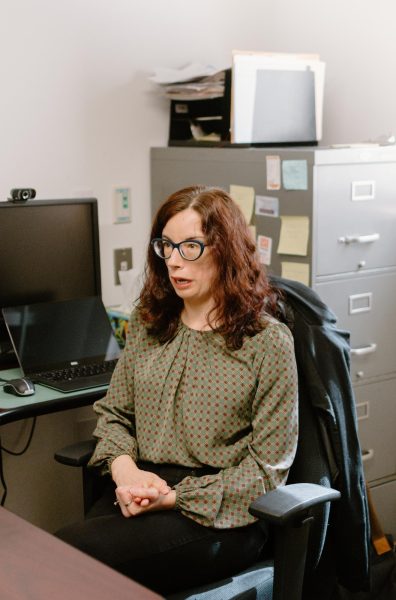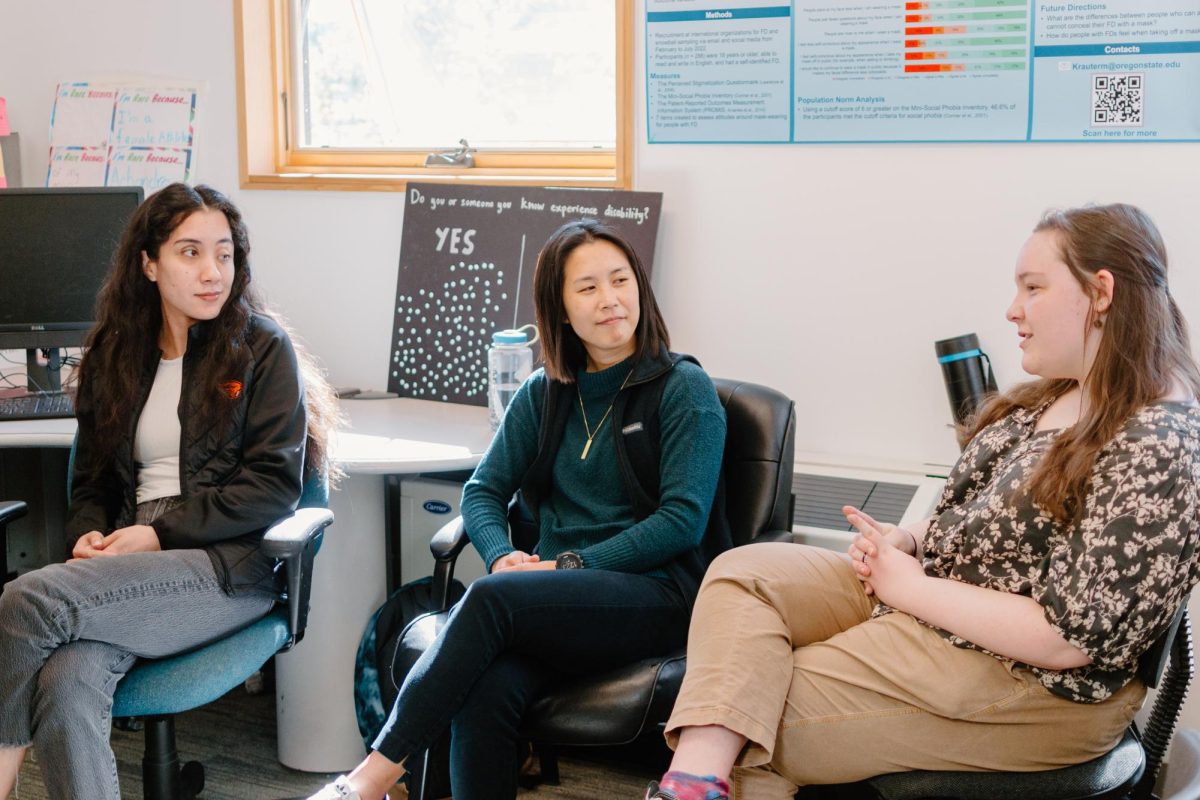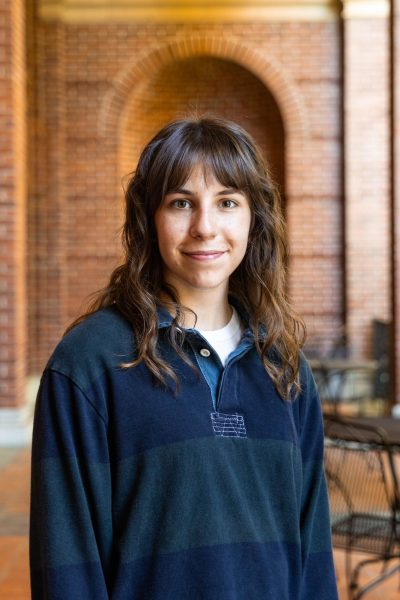Editor’s note: The headline has been updated from the original version to match the print version.
Inside a small room with poster-clad walls, a psychology lab at Oregon State University is making big strides in disability research.
The Disability and Social Interaction Lab examines ableism and psychosocial components of rare disorders. The DSIL applies a unique social psychological perspective to disability research, studying topics like societal attitudes and managing stigma.
The DSIL is located on the OSU campus in Reed Lodge but the lab team’s research has taken them to both national and international conferences.
According to Kathleen Bogart, associate professor of psychology and director of the DSIL, over 50 students have worked in the lab since she founded it in 2012 and many research projects are inspired by student interest.
“Large themes are focusing on disability as a social identity and minority group rather than looking at things from a medical model perspective,” Bogart said.
People with disabilities make up the largest minority group in the United States, as nearly 20% of Americans have a disability, according to the DSIL website. The lab studies ableism–“the forgotten ‘ism’”–and contributes to academic research while educating the public.
“What’s really neat about our lab is that the majority of us are disabled ourselves,” Bogart said. “So we’re really representing the communities we’re trying to support.”
Bogart’s personal experience with a disability shaped her career in psychology and led her to create the Disability and Social Interaction Lab 11 years ago.
“I was born with facial paralysis, and it made me really interested in communication and adaptation and social interaction and, when I think back to it, I think it really did influence my interest in psychology,” Bogart said.

In college and grad school, Bogart wanted to explore those connections further, but noticed there weren’t many psychologists in that area of research.
“I became really interested in conducting some of that research, filling those gaps,” Bogart said.
Sydney Tran, a doctoral student in the DSIL, became involved with the lab when she took one of Bogart’s psychology classes on disability and ableism. She eventually transferred labs into the DSIL partway through her graduate program.
“Studying disability from a biological standpoint has sort of existed longer than the social psychological perspective, so I think that is where our contributions come in,” Tran said. “We are adding to the field’s understanding of ableism.”
Tran is writing her dissertation on disability beliefs within the Asian American community, surveying and interviewing disabled Asian Americans to explore cultural influences on disability attitudes and mental health.
The DSIL team also focuses on rare disorders–a subset of disability–and building social support for that community.
“(Researching rare disorders) continues in our theme of studying the minoritized within the minoritized,” Bogart said. “When you look at the biological processes of each of 7,000 plus (rare) disorders, it’s all going to be different, but when you take a psychological lens, we see a lot of commonalities and people feeling isolated, craving community and feeling stigmatized because others may not recognize their disability or believe them.”
The DSIL recently tabled in the Student Experience Center Plaza for Rare Disease Day, the last day in February, to raise awareness in the OSU community and engage in conversations about disability, according to Bogart.
Madeleine Limon, an undergraduate honors student in the DSIL, is part of a current research project on mental health in the first generations of adults with Fanconi Anemia. FA, she explained, is a rare disease that involves increased predisposition for cancer, organ failure and bone marrow failure.
“We found that there was increased prevalence of anxiety, depression and PTSD in the whole surveyed FA population (compared to adults without FA),” Limon said.
According to Bogart, the study includes an advisory board of people living with FA who provide insights and help guide the lab’s research.
“It’s really important to have whatever community members are stakeholders involved in the whole process,” Bogart said.
Limon is a biohealth sciences pre-med major who stumbled into psychology research when she applied for a job at the DSIL. Two years later, her career trajectory has completely changed.
After wanting to be a medical doctor since first grade, Limon now plans to apply to graduate programs for psychology. Through her work at the lab, she realized that she wants a long-term career in academic psychology research, specifically focused on disability.
The DSIL has also provided exposure to disability pride and advocacy methods, allowing Limon to better understand what it means to be disabled alongside her other intersecting minority identities.
“I’ve seen many disabled people within the lab be very successful and disabled at the same time,” Limon said. “It’s been great to look up to them as role models and be like, you don’t have to sacrifice your disabled body for success. You can have both.”
In addition to the DSIL, Bogart started the Disability Advocacy and Research Network, a community for disabled psychology scholars and allies and blogs for Psychology Today, a media outlet that focuses on psychology and human behavior.
For each study published by the DSIL, a simplified summary is added to Bogart’s blog, “Disability is Diversity.”
“We always want to be sure that our findings are also available to the general public for free, and to people with disabilities, in a way that they can understand,” Bogart said.




















































































![Newspaper clipping from February 25, 1970 in the Daily Barometer showing an article written by Bob Allen, past Barometer Editor. This article was written to spotlight both the student body’s lack of participation with student government at the time in conjunction with their class representatives response. [It’s important to note ASOSU was not structured identically to today’s standards, likely having a president on behalf of each class work together as one entity as opposed to one president representing all classes.]](https://dailybaro.orangemedianetwork.com/wp-content/uploads/2025/03/Screenshot-2025-03-12-1.00.42-PM-e1741811160853.png)

























